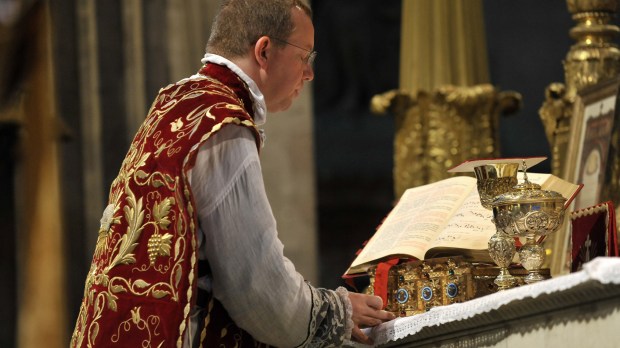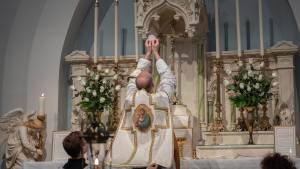Pope Francis signed a decree on February 11, 2022, exempting priests of the Priestly Fraternity of St. Peter (FSSP) from the provisions of the Motu Proprio Traditionis Custodes, which restricts the possibilities of celebrating the Tridentine Mass.
This was reported by a FSSP press release issued on February 21. The weekly Famille Chrétienne said the exemption could be extended to other traditionalist institutes that remain loyal to Rome.
The uncertainty that had hovered for several months was resolved after a private audience of nearly an hour granted by Pope Francis on February 4 to Abbot Benedict Paul-Joseph, superior of the FSSP’s District of France, and Vincent Ribeton, rector of St. Peter’s Seminary in Wigratzbad, Germany, where 90 seminarians are in formation. This meeting was not on the Pontiff’s public agenda.
Interviewed by Famille chrétienne, Father Paul-Joseph explains that the Pope was attentive and reassuring about the future of the community. “During this very paternal conversation, the Holy Father (…) affirmed to us that the Motu Proprio Traditionis Custodes was not intended for us, since we are members of a community founded specifically for the use of ancient liturgical books, and that we were therefore preserving the right that had been given to us,” says the superior of the FSSP’s French district.
In recalling the birth of the Fraternity in 1988, the statement said, “the Pope said he was very impressed by the approach of its founders, their desire to remain faithful to the Roman Pontiff and their trust in the Church. He assured that this gesture should be ‘preserved, protected and encouraged.'”
A decree signed by Pope Francis a week later then confirmed the provisions that had been granted to the priests of the FSSP at its founding in 1988. Thus, they retain the possibility “to celebrate the sacrifice of the Mass, the ritual of the sacraments and other sacred rites, as well as the recitation of the Divine Office according to the typical editions of the liturgical books in force in 1962, namely the Missal, the Ritual, the Pontifical and the Roman Breviary.”
In his personal dialogue with the two leaders of the FSSP, the Pope assured that ordinations in the Tridentine Rite could continue. The Pope also asked the Fraternity of St. Peter to reflect, “as far as possible,” on the provisions of the Motu proprio Traditionis custodes.
An extension to other institutes?
Famille Chrétienne also reports that a decree is being prepared for the month of March to specify the exemptions from which other traditionalist but not schismatic communities could benefit.
These communities are the result of the Motu Proprio Ecclesia Dei, signed by John Paul II on July 2, 1988, which aimed to encourage the return under the authority of the pope of clerics and faithful tempted to follow Archbishop Lefebvre, founder of the Society of St. Pius X, in his rejection of the Second Vatican Council.
These communities may follow the Tridentine rite in their own churches and oratories, and may be called by some bishops to assume liturgical and pastoral tasks in other churches, provided they are in communion with the diocese. In some cases, participation in the Chrism Mass is a stumbling block, given the reluctance of some priests to concelebrate in the post-conciliar rite.
The choice of loyalty to Rome
The Fraternity of St. Peter was founded on July 18, 1988, at the Abbey of Hauterive, Switzerland, by 12 priests who had renounced following Archbishop Lefebvre after the schism provoked by the ordination, on June 30, of four bishops without a papal mandate.
For more than three decades, the Fraternity, which currently has about 330 priests, has been growing particularly in Europe and the United States. It is present in France in some 40 dioceses.
In a statement issued on July 20, 2021, four days after the release of Traditionis Custodes, the Fraternity of St. Peter expressed surprise at the restrictions, while leaving the door open to an agreement.
“In the present context, we wish to reaffirm our unwavering fidelity to the Successor of Peter, and our desire to remain faithful to our Constitutions and our charism, continuing to serve the faithful as we have done since our foundation,” the FFSP said at the time.
Pope Francis’ message of encouragement in 2013
At the beginning of his pontificate, Pope Francis expressed his esteem for the work of the FSSP. In a message addressed to Father Vincent Ribeton, then superior of the District of France, on October 29, 2013, he sent his apostolic blessing to the members of the Fraternity on the occasion of the 25th anniversary of its founding.
The Bishop of Rome praised the “great spirit of obedience and hope” of the founders, who had “turned with confidence to the Successor of Peter in order to offer the faithful attached to the 1962 Missal the possibility of living their faith in the full communion of the Church.”
He also invited the community to “take an active part in the mission of the Church in today’s world, through the witness of a holy life, a firm faith and an inventive and generous charity.”
Recognizing the “proper charism” of the Fraternity of St. Peter, he praised its contribution “to a better understanding and implementation of the Second Vatican Council” by linking the celebration of “the sacred mysteries according to the Extraordinary Form of the Roman Rite” with “fidelity to the living tradition of the Church.”


